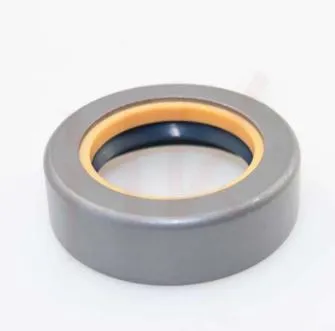Jun . 06, 2025 09:18 Zurück zur Liste
The Trans-formative Journey of Wheel Hub Oil Seals
The wheel hub oil seal has undergone significant transformations over the years, evolving from simple gaskets to sophisticated polymer-based designs. These advancements have greatly improved vehicle performance, durability, and efficiency.

Wheel Hub Oil Seals: Early Beginnings -The Basic Gasket Era
The earliest wheel hub seals were rudimentary gaskets made from materials like cork or leather. These seals provided minimal protection against dirt, water, and lubricant leakage. While functional for their time, they wore out quickly under harsh conditions, leading to frequent replacements. The limitations of these early designs spurred the need for more resilient solutions.
As technology advanced, engineers began to experiment with new materials and designs to improve the durability and effectiveness of wheel hub seals. Rubber, metal, and synthetic compounds were among the materials explored, each offering unique benefits in terms of resilience, flexibility, and sealing capabilities. The evolution of manufacturing processes also played a crucial role, enabling the production of seals with tighter tolerances and more precise fits. These advancements led to the development of wheel hub seals that could withstand higher temperatures, pressures, and speeds, significantly extending their lifespan and reducing the need for frequent replacements.
As automotive technology advanced, manufacturers sought better materials to enhance the longevity of hub oil seals. The introduction of rubber-based seals marked a significant improvement, offering better flexibility and resistance to environmental factors. However, these early rubber seals still struggled under extreme temperatures and high-speed rotations.
Wheel Hub Oil Seals: The Emergence of Synthetic Rubber and Metal Hybrids
The next major leap in wheel oil seal technology came with synthetic rubber compounds, such as nitrile and silicone. These materials provided superior heat resistance and durability compared to natural rubber. Additionally, metal casings were integrated to reinforce the seal’s structure, preventing deformation under pressure.
This hybrid design significantly extended the lifespan of wheel hub seals, reducing maintenance costs for vehicle owners. The metal-rubber combination also improved sealing efficiency, minimizing lubricant leaks and contamination. These innovations made hub seals more reliable for heavy-duty applications, including trucks and industrial machinery.
Wheel Hub Oil Seals: Advanced Polymer Designs - The Modern Standard
Today, the wheel hub oil seal industry relies heavily on advanced polymers These materials excel in extreme conditions, offering unmatched resistance to heat, chemicals, and abrasion. Modern seals also feature precision-engineered lips that maintain consistent contact with rotating shafts, ensuring optimal performance.
The integration of self-lubricating properties in polymer-based hub oil seals has further reduced friction and wear. Additionally, some high-end models incorporate multiple sealing layers to block contaminants more effectively. These advancements have made contemporary wheel oil seals indispensable in both automotive and industrial sectors.
Why Wholesalers Should Promote Wheel Hub Oil Seals
As the demand for high-performance wheel hub oil seals grows, wholesalers have a prime opportunity to capitalize on this market. Modern polymer-based hub seals offer longer service life, reducing replacement frequency and boosting customer satisfaction. By stocking advanced wheel oil seals, wholesalers can attract a broader clientele, including automotive repair shops and industrial suppliers.
Our company specializes in cutting-edge hub oil seals, designed to meet the highest industry standards. We encourage wholesalers to partner with us and offer these superior products to their customers. Bulk orders are available at competitive prices, ensuring maximum profitability for your business.
FAQ: Common Questions About Wheel Hub Oil Seals
What is the primary function of a wheel hub oil seal?
The wheel hub seal prevents lubricant leakage and blocks contaminants like dirt and water from entering the bearing assembly. This ensures smooth operation and prolongs the lifespan of wheel components.
How do modern polymer wheel hub oil seal outperform traditional rubber seals?
Advanced polymer wheel oil seals offer superior heat resistance, reduced friction, and enhanced durability. They also maintain a tighter seal under high-speed rotations, making them ideal for modern vehicles.
When should a wheel hub oil seal be replaced?
A Nabendichtung should be replaced if there are signs of lubricant leaks, unusual noises, or bearing failure. Regular inspections during maintenance can help detect wear early.
Can I install a wheel hub oil seal myself?
While DIY installation is possible, professional installation is recommended to ensure proper alignment and sealing. Incorrect installation can lead to premature failure.
Why should wholesalers choose our company’s wheel hub oil seal?
Our hub seals are manufactured with premium materials and undergo rigorous testing. We offer competitive pricing, bulk discounts, and reliable customer support, making us the ideal partner for wholesalers.
In conclusion, the evolution of wheel hub oil seals reflects the automotive industry’s relentless pursuit of excellence. Wholesalers can play a pivotal role in distributing these advanced products, ensuring their customers benefit from superior performance and longevity. Partner with us today and elevate your product offerings with top-tier hub oil seals!
-
Graphene-Enhanced Oil Seals: Revolutionizing High-Pressure Oil Sealing
NachrichtJun.06,2025
-
Future of Hydraulic Sealing: Advanced Intelligent TCN Oil Seals
NachrichtJun.06,2025
-
Don’t Let a Broken TCV Oil Seal Ruin Your Day
NachrichtJun.06,2025
-
Bio-Inspired Dust Seals for Better Sealing Performance
NachrichtJun.06,2025
-
Biodegradable and Sustainable Hydraulic Seal Materials
NachrichtJun.06,2025
-
Top Oil Seal Solutions for Your Industrial Needs
NachrichtMay.22,2025
-
Reliable High-Pressure Oil Seals for Industrial Efficiency
NachrichtMay.22,2025
Produktkategorien
















